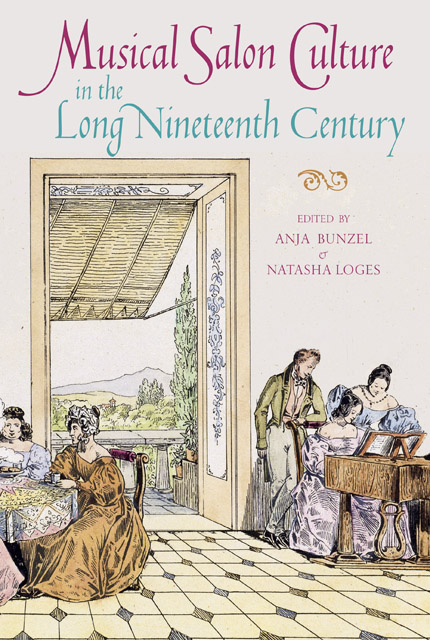12 - Traditions, Preferences and Musical Taste in the Staegemann-Olfers Salon in Nineteenth-Century Berlin
Published online by Cambridge University Press: 17 January 2023
Summary
Musical patronage, making music, listening to music and talking about it were important constituents of nineteenth-century Berlin salon sociability. Sara Levy (1761–1854), the great-aunt of Fanny and Felix Mendelssohn, supported the Berlin Sing-Akademie and was a lifelong champion of the music of the Bach family; Meyerbeer’s mother Amalia Beer (1767–1854) had remarkable merits as a kind patroness; and later the salonnière Mimi Countess Schleinitz-Wolkenstein (1842–1912) created the Wagnergemeinde in Berlin. But music was also present in other, predominantly literary salons. The way in which music was integrated into conversation and cultural memory can be exemplified by the Staegemann-Olfers circle, a literary salon which existed for three generations (c. 1810–c. 1914) and which is documented by an extensive family correspondence. Though limited financial means did not allow musical patronage, amateurs and professionals attended in order to socialise among guests with diverse interests, and agreed to play or sing if they felt like it. Sometimes musical soirées were held, but more often, music was improvised. Music was regarded as a means of modulating and enhancing sociability, but was not treated as a mere divertimento. In this chapter, I will concentrate mainly, though not exclusively, on vocal music and the interrelationship of the arts in the Staegemann-Olfers salon. The chronological survey of this case study hopes to demonstrate how family tradition influenced musical sociability, keeping the authentic spirit of Romanticism alive for a century. It reinforces the assessment that real salon sociability depended less on great occasions than on a long-term association of friends sharing cultural interests. Hitherto, scholarly research on musical aspects of the Staegemann-Olfers salon has focused on the first half of the nineteenth century, especially on the famous Müllerlieder, whereas this study aims to give a more complete picture, illuminating the salonnières’ musical circles well into the early twentieth century.
The style of this salon was set by Elisabeth von Staegemann née Fischer (1761– 1835) from Königsberg in East Prussia, who grew up in the lively musical circles of her native town and in 1780 married Carl Ferdinand Graun, the youngest son of the famous composer.
- Type
- Chapter
- Information
- Musical Salon Culture in the Long Nineteenth Century , pp. 185 - 198Publisher: Boydell & BrewerPrint publication year: 2019



